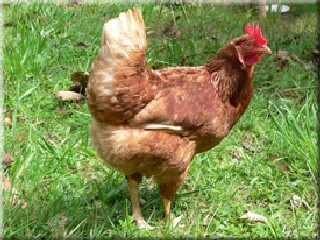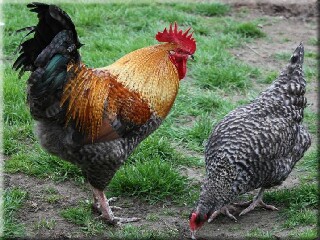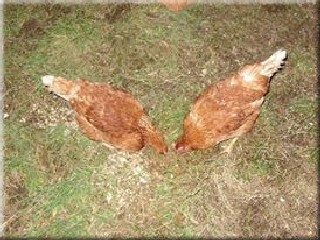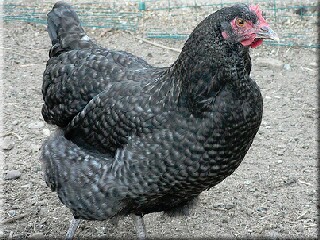The Chicken is a type of domesticated fowl, a subspecies of the
red junglefowl. It is one of the most common and widespread domestic animals, with a total population of more
than 19 billion as of 2011. Humans keep chickens primarily as a source of food, consuming
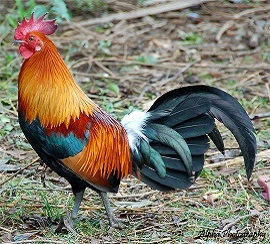 |
| Jungle Fowl |
both their meat and
their eggs. From India, the domesticated chicken was imported to Lydia in western Asia Minor, and to Greece by
the fifth century BC. Fowl had been known in Egypt since the mid-15th century BC, with the "bird that gives birth
every day" having come to Egypt from the land between Syria and Shinar, Babylonia, according to the annals of
Thutmose III. Chickens are omnivores. In the wild, they often scratch at the soil to search for seeds, insects and
even animals as large as lizards, small snakes or young mice. Chickens may live for five to ten years, depending on the
breed. The world's oldest chicken was a hen which died of heart failure at the age of 16 according to Guinness World
Records. The males are known as Roosters, Cocks and Cockerels, the females are known as Hens and Pullets, the young are called Chicks and
they all known by the slang terms of Chooks and Yardbirds. Chickens are gregarious birds and live together in flocks. They have a communal approach
to the incubation of eggs and raising of young. Individual chickens in a flock will dominate others, establishing a "pecking
order", with dominant individuals having priority for food access and nesting locations. Removing hens or roosters from a
flock causes a temporary disruption to this social order until a new pecking order is established. Adding hens, especially
younger birds, to an
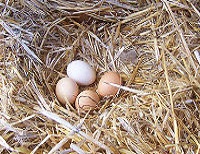 |
| Chicken eggs vary in colour depending on the hen, typically ranging from bright white through all the
shades of brown with some even blue and green. |
existing flock can lead to fighting and injury. When a rooster finds food, he may call other chickens
to eat first. He does this by clucking in a high pitch as well as picking up and dropping the food. This behaviour may
also be observed in mother hens to call their chicks and encourage them to eat. A rooster's crowing is a loud and sometimes
shrill call and sends a territorial signal to other roosters. However, roosters may also crow in response to sudden disturbances
within their surroundings. Hens cluck loudly after laying an egg, and also to call their chicks. Under natural conditions, most birds lay only
until a clutch is complete, and they will then incubate all the eggs. Many domestic hens will also do this and are then said to "go
broody". The broody hen will stop laying and instead will focus on the incubation of the eggs (a full clutch is usually about 12 eggs). She
will "sit" on the nest, protesting or pecking in defence if disturbed or removed, and she will rarely leave the nest to eat, drink,
or dust-bathe. While brooding, the hen maintains the nest at a constant temperature and humidity, as well as turning the eggs regularly during
the first part of the incubation. Modern egg-laying breeds rarely go broody, however, some "utility" (general purpose) breeds do regularly go
broody, and they make excellent mothers, not only for chicken eggs but also for those of other species even those with much smaller or larger
eggs and different incubation periods.


